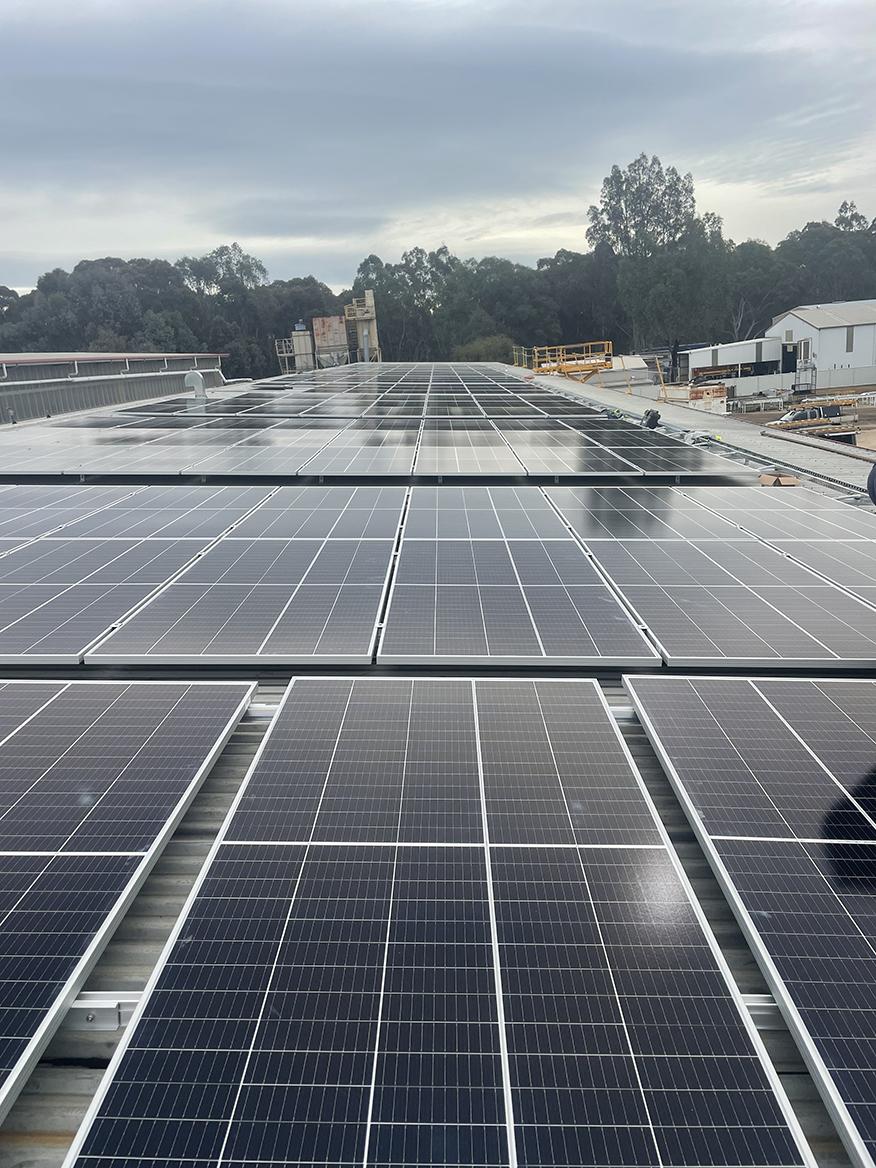Not-for-profit social enterprises such as Merriwa Industries in Wangaratta, Victoria are overcoming a lack of technical expertise and financial barriers to install small-scale renewable energy generators.
Merriwa Industries installed a 99.5 kW solar photovoltaic (PV) system on the building where their all-abilities workforce manufactures engineered timber products. The solar system comprises 199 solar PV panels and 2 inverters and powers lights and timber machinery during daylight hours. The system reduces Merriwa Industries’ energy usage by 116,000 kWh/year and the reduced carbon emissions are equivalent to 20.9 average households using renewable electricity instead of grid electricity.
Scott Grant from Merriwa Industries said the organisation committed to a renewable energy strategy after an energy audit identified initiatives with the greatest environmental benefit.
“This is the first solar installation for Merriwa. We have 2 other substantial power consumers that we will be considering converting to solar power.
“Our staff are very excited about this installation and they are passionate about our environmental commitment. Our 2024 goal is to convert all our power needs to a renewable source. This includes off-pole providers being chosen for their renewables focus.
“We didn’t have any expertise in renewable energy, so the ability to access industry experts has been fundamental in our approach.”
Merriwa Industries accessed free technical advice from the Hume Community Power Hub (the hub) before they selected their solar system. Jointly delivered by social enterprises Indigo Power and GV Community Energy, the hub promotes community action to reduce greenhouse gas emissions and encourage sustainable living through community-based renewable energy projects in the Hume region in northern Victoria. During the 2021/22 financial year the hub delivered the Solar for Good program with the support of Sustainability Victoria and funding from the Victorian Government.
Geoff Lodge, CEO of GV Community Energy, says through the Solar for Good program they were able to help Merriwa Industries identify the right solar system for their needs.
“The Solar for Good program offered a free and independent solar assessment, preliminary design and procurement service to not-for-profit organisations.
“For Merriwa Industries, we organised a solar assessment and design for a 99.5 kW system, organised and critiqued quotes from potential installers, and supported Merriwa Industries management to make an informed selection of a suitable solar supplier.”
After Merriwa Industries had their quote finalised, they were referred to Citizens Own Renewable Energy Network Australia (CORENA) to organise a no-interest loan to pay for the system. CORENA operate a perpetual revolving fund for practical renewable energy projects for not-for-profit organisations. CORENA financed the loan for Merriwa Industries’ solar panel installation through supporter’s donations and project loan repayments from previous projects. CORENA advised Merriwa of the expected savings on their power bills and suggested a quarterly repayment instalment amount based on these savings.
Sarah McCabe, Head of Operations at CORENA, who is always on the lookout for new projects to finance, said the Merriwa Industries project had been a community effort.
"We were delighted to be put in contact with Merriwa Industries by one of our long-term supporters.
“This project has been a great example of a partnership between CORENA and local groups with local expertise.
“We encourage any community members or groups to get in contact with us if they know of a not-for-profit that would be interested in installing solar panels, reducing their energy use or purchasing electric vehicles.”
The quotes Merriwa Industries sought from solar installers factored in a financial incentive through the Clean Energy Regulator’s Small-Scale Renewable Energy Scheme (SRES). Small solar installations, with a capacity of no more than 100 kW in size and a total annual electricity output less than 250 MWh, can qualify for the SRES.
The SRES encourages individuals or small businesses to install eligible small-scale renewable energy systems such as solar panels, small-scale wind systems, small-scale hydro systems, solar water heaters and air source heat pumps.
The SRES operates through the creation of small-scale technology certificates (STCs) issued by the Clean Energy Regulator. The number of STCs issued is calculated on the amount of electricity a system produces or replaces (that is, electricity from non-renewable sources) until the scheme ends in 2030. System owners can choose to assign the rights to the STCs to an agent in return for an up-front discount on their system installation.
With electricity prices rising, solar PV installations are an excellent investment opportunity for consumers and businesses to manage their electricity bills into the future. STCs cover approximately a third of the cost of a solar system installation and further incentives or rebates may be available from state and territory schemes.
Learn more about systems eligible under the Small-scale Renewable Energy Scheme.

